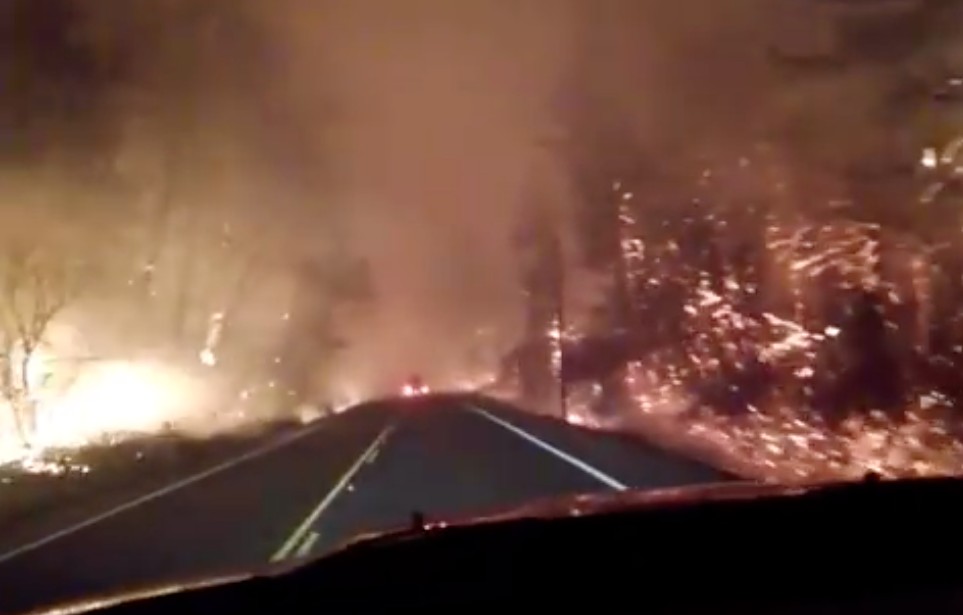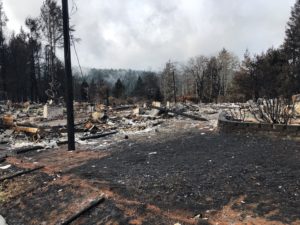
By TED SICKINGER/The Oregonian/OregonLive
A Multnomah County jury slapped PacifiCorp with nearly $18 million in punitive damages Wednesday after determining its conduct during the 2020 Labor Day wildfires was reprehensible and showed a reckless and outrageous indifference to the wellbeing of residents of the communities ravaged by four fires that weekend.
The punitive award was 25% of the nearly $72 million in compensatory damages that the jury awarded the same plaintiffs on Monday for property losses and pain and suffering after determining that the utility’s conduct was grossly negligent, reckless and willful. Each of the named individuals in the lawsuit was awarded between $3 million and $5.5 million in compensation.
The decision on both liability and punitive damages will apply to the entire class of some 5,000 survivors of the four fires. Those plaintiffs will need to prove their damages in a future court proceeding, but any actual damages awarded will be increased by 25 percent.
Under Oregon statute, the economic damages awarded to wildfire victims can also be doubled if the defendant’s conduct is determined to be reckless or willful, so the amount awarded to plaintiffs Monday may grow further.
In a news release issued Wednesday, the plaintiffs’ lawyers said the verdicts paved the way for billions of dollars in potential future compensation for victims. As such, they said it would be the largest civil jury verdict in Oregon history.
“This verdict is an important milestone for the thousands of Oregonians who lived through the Labor Day fires,” said Matt Preusch, a lawyer with Keller Rohrbach, co-lead counsel for the plaintiffs along with Edelson PC and Stoll Berne. “It not only provides answers to so many Oregonians who have been waiting for years, but it finally holds PacifiCorp accountable for its conduct.”
It was a crushing defeat for PacifiCorp, whose lawyers told jurors Tuesday that a sizable punitive damage award, applied to the larger class, could send it into bankruptcy. The company had issued a news release Monday saying it planned to appeal the verdict and was “confident we will prevail.”
Plaintiffs in the lawsuit alleged that their properties were destroyed by power-line caused fires, and that PacifiCorp was negligent in failing to de-energize its lines amid dire forecasts of an impending windstorm and extreme fire danger.
Some 2,500 private properties burned in the four fires at issue, which included the Echo Mountain complex near Lincoln City, the Santiam fires east of Salem, the South Obenchain fire northeast of Medford, and the Two Four Two near the upper Klamath town of Chiloquin.
During the daylong proceeding over punitive damages, plaintiffs’ attorneys hammered on their claim that the company and its executives had accepted no responsibility for their actions during the trial or after the verdict. They claimed deficient tree trimming and maintenance practices were part of a pattern and practice at PacifiCorp that had caused a host of other destructive wildfires before and after Labor Day 2020. And they told the jury that imposing punitive damages was their opportunity to send a direct message to a highly profitable company about accountability and deterrence.
“This is a corporation. What matters to them is money,” Cody Berne, a lawyer in Stoll Berne’s Portland office, told jurors. “That is the power you now have, to speak to them in the language that they know, to speak to them in the language they understand. And that is money.”
PacifiCorp, Oregon’s second-largest utility, is a subsidiary of billionaire Warren Buffett’s conglomerate, Berkshire Hathaway.
The defense, meanwhile, suggested that Monday’s $72 million damage award had already delivered a resounding message, that the company had vastly upgraded its wildfire preparedness since 2020, and that a punitive damage award, when applied to thousands of plaintiffs in the class, could result in utility’s bankruptcy.
Doug Dixon, a lawyer with PacifiCorp’s lead counsel, Hueston Hennigan, argued that such an award required a finding that the utility’s employees were utterly indifferent to the plight of the fires’ victims. He said that was a bar the plaintiffs couldn’t meet, as demonstrated by the wildfire mitigation, tree trimming and inspection programs the company had in place to address risks to residents in its service territory.
“You need to decide whether the women and men of Pacific Power did not care about the harm their actions caused,” Dixon told jurors, referring to the corporation’s Oregon subsidiary. “Your verdict in the first case sent a very clear message that Pacific Power did not do enough to protect the people in the four fire areas. But not doing enough and showing indifference, let alone outrageous or reckless indifference, are two very different things.”
The standard of proof for awarding punitive damages was higher than it was in the initial phase of the trial. It required plaintiffs to prove by clear and convincing evidence that PacifiCorp acted with reckless disregard to victims’ welfare, versus a preponderance of the evidence for awarding compensatory damages, which meant the plaintiffs only had to prove that it was more likely true that PacifiCorp’s negligence caused or was a substantial cause of harm.
Punitive damages are designed to penalize wrongdoers for particularly egregious behavior and deter them or others from similar conduct. Seventy percent of such awards go to the state. Plaintiffs receive the remaining 30% but pay attorneys’ fees out of that portion. Contingency fees for plaintiffs lawyers in wildfire cases vary by firm, but typically range between 30% and 40% of damages awarded.
The court is required to review the punitive damages award to determine if its reasonable, and PacifiCorp can request it be reduced by establishing that it has taken steps to ensure the conduct in question never reoccurs.
Beyond the Multnomah County lawsuit, PacifiCorp has separately been sued by some 215 families and seven timber companies who lost property in the Archie Creek fire, which ignited on Labor Day and burned along the North Umpqua River east of Roseburg.
Independent investigations by the U.S. Forest Service, the Bureau of Land Management and the Douglas Forest Protective Association have determined that PacifiCorp equipment caused or likely caused three separate Archie Creek ignitions at locations miles apart. The company has already settled with two families whose properties were damaged in that fire.
The remaining plaintiffs are seeking nearly $600 million in economic damages alone. That trial, in Douglas County, is set for November. Monday’s verdict could put pressure on PacifiCorp to settle before the case goes to trial.
–Ted Sickinger; tsickinger@oregonian.com; 503-221-8505; @tedsickinger
Monday, June 12
By OREGON PUBIC BROADCASTING
Oregon’s second-largest electrical utility, PacifiCorp, played a significant role in the Labor Day wildfires that ravaged parts of the state in 2020, according to a Multnomah County jury.
Jurors returned a nearly unanimous verdict Monday that found the utility caused a substantial amount of damage related to fires in the Santiam Canyon, as well as the South Obenchain and 242 fires in Southern Oregon and the Echo Mountain Complex Fire on the Oregon Coast.
After less than two days of deliberations, jurors found the company owes more than $73 million in total to the 17 plaintiffs in the case for losses related to the fires and for emotional suffering. That amount could rise after jurors assess punitive damages in the case. The jury also found that a broader class of potentially thousands of people can bring claims against PacifiCorp for the fires in a future court proceeding.

Plaintiff Rachelle McMaster, who lost her home in Otis to the Echo Mountain Complex Fire, cried and hugged family members outside the courtroom after the jury decision was announced.
Fire victims frequently said throughout the proceedings that they wanted an outcome to the trial that helped them move past the trauma of 2020.
“While the Santiam Canyon will never be the same, I hope this verdict will help in the long term healing and recovery of what took many lifetimes to build,” said Sam Drevo, one of the plaintiffs in the case.
Bill Edge, who lost his home to the Santiam Canyon fires, said he cried too as he learned of the verdict while at home in the manufactured home that now sits on his property.
“After three years, we have been constantly reliving the incident over and over through questioning, counseling, lawyers, insurance companies,” Edge said in a text message, “now we get to start our journey to recovery.”
Lawyers for the plaintiffs declined to comment immediately Monday.
Since late April, jurors have listened to a wide-ranging case from attorneys representing 17 plaintiffs whose properties burned in the four fires. Throughout their case, the plaintiffs’ lawyers said leaders at PacifiCorp, which is owned by the multinational holding company Berkshire Hathaway, should have known from weather reports and other warnings that a major windstorm and extremely dry conditions had the potential to start uncontrollable wildfires on Labor Day 2020. The plaintiffs’ case relied on 911 calls, PacifiCorp’s internal documents, wildfire experts and emotional testimony from the victims to show that the utility’s decision to leave power lines energized directly led to fires.
Jurors in the case found PacifiCorp liable for damages in five of the six legal areas the plaintiffs’ lawyers argued, including gross negligence and recklessness.
Following the verdict, PacifiCorp issued a statement that reiterated much of its defense, saying that the 2020 fires were the result of climate change and a hard-to-predict weather event, not the company’s equipment.
“Escalating climate change, challenging state and federal forest management, and population growth in the wildland-urban interface are substantial factors contributing to growing wildfire risk,” PacifiCorp wrote. “These systemic issues affect all Oregonians and are larger than any single utility.”
The company said it plans to appeal Monday’s ruling. The court proceeding will now head to a second phase in which a jury will assess potential damages owed to potentially thousands of people who had property damaged by the four fires.
Ralph Bloemers, who works at the wildfire resilience nonprofit Green Oregon, was among the first to document power line ignitions in the Santiam Canyon after the 2020 wildfires started. In a statement, he said the trial “laid bare” that PacifiCorp had started fires and tried to obscure that by removing its damaged equipment.
“I was shocked by how little the company’s top people claimed to remember and by how much evidence they admitted destroying,” Bloemers said.
What effect Monday’s verdict will have on customers of PacifiCorp’s Oregon utility, Pacific Power, remains to be seen.
The Oregon Public Utility Commission, which oversees and approves rate increases in the state, said in some cases, utilities can request rate hikes beyond what has been approved so they can recover costs from “unexpected, extraordinary events.”
“We have no information about whether or when PacifiCorp may decide to file with the PUC to recover any costs associated with this litigation through customer rates,” agency spokesperson Kandi Young said in an email. “The PUC would scrutinize any such request in an open public process.”
Bob Jenks with the Oregon Citizens’ Utility Board, which represents the interests of ratepayers, said the utility could not reasonably pass on the costs from Monday’s verdict to its customers because the jury found the company was grossly negligent. He said it may be possible that customers will have to pay more in the future if PacifiCorp decides to spend more money on tree trimming and other wildfire mitigation efforts.
Still, he said, the verdict was a clear message.
“To me, this was a pretty harsh verdict against PacifiCorp,” Jenks said. “It’s clearly sending the message to companies that you can be held liable.”
The company’s legal troubles may not be over either. Others who said they have been damaged by fires PacifiCorp started have indicated a desire to sue, and Monday’s verdict may signal juries are willing to listen.




The most comprehensive coverage of any news outlet. Thank you.